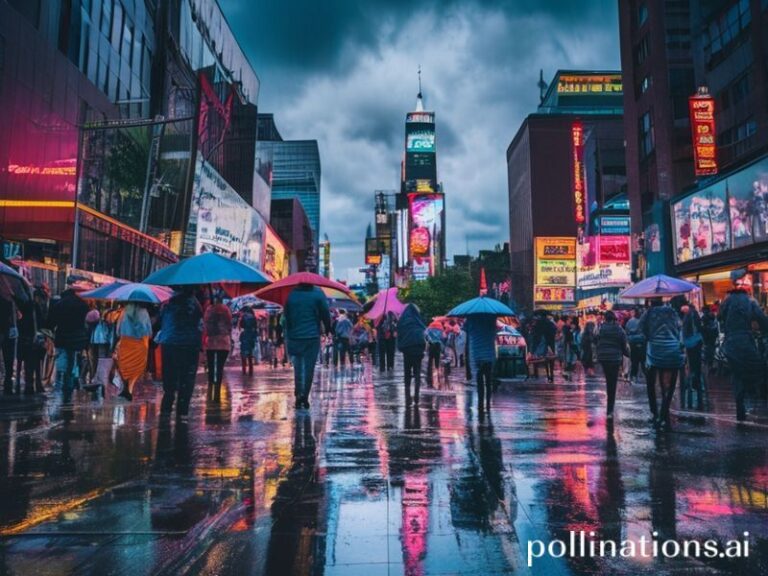From Bondi to Beijing: How Margot Robbie Conquered the World Without Firing a Shot
The sun never sets on the Margot Robbie empire. Somewhere between a Bondi Beach surf shack and the marble boardrooms of Burbank, the Australian export has quietly become the most efficient soft-power weapon the Commonwealth never budgeted for. While Canberra argues over submarines it may never receive, Robbie has already infiltrated multiplexes from Mumbai to Munich with nothing more lethal than a dazzling smile and a gift for picking scripts that translate better than any trade deal.
From an international vantage point—say, a cramped flat in Warsaw where Barbie still streams in defiance of the local culture minister—Robbie’s ascent looks less like a Hollywood fairytale and more like a masterclass in 21st-century geopolitical branding. She is the rare cultural product that both Washington and Beijing will screen uncensored, a diplomatic feat the UN has been failing at since 1945. When Warner Bros. shipped 4,000 pink Barbie dreamhouses to 69 countries last summer, customs officers stamped “No declared ideology” and waved them through. Try that with a crate of American beef.
Observers in Seoul’s Gangnam district note that Robbie’s production company, LuckyChap, functions like a boutique nation-state: it mints currency in the form of prestige, exports content faster than Korea ships kimchi, and maintains a foreign policy that can pivot from prestige arthouse (I, Tonya) to neon populism (Birds of Prey) without ever apologizing for the whiplash. The French, who measure everything against their own cultural exception, have grudgingly granted her a César nomination—proof that even Parisian gatekeepers recognize a stealth invasion when ticket sales scream “Liberté, égalité, merchandising.”
Of course, darker currents swirl beneath the glossy surface. In Jakarta, clerics issued a fatwa against the “anatomically implausible” Barbie doll, inadvertently driving black-market sales through the mosque-adjacent roof. Meanwhile, Moscow’s culture ministry labeled Robbie a “Western psy-op designed to destabilize Slavic femininity,” which only made pirated copies hotter contraband than NATO night-vision goggles. There is something grimly comic about watching authoritarian regimes attempt to censor a woman who once played a psychotic DC villain armed only with a baseball bat and glitter—like banning sugar while the city burns.
Economists at the IMF, taking a rare break from ruining breakfast in developing nations, estimate the Robbie Effect added 0.3% to global GDP last year via pink paint shortages, Airbnb bookings in Malibu, and a spike in roller-skate futures. Even the Swiss—neutral since yodeling was invented—reported a run on hot-pink timepieces. When the gnomes of Zurich start hedging against plastic stilettos, you know the zeitgeist has achieved weapons-grade saturation.
Yet the most telling metric comes from Lagos, where Nollywood directors have already green-lit “Naija Barbie,” swapping Malibu for the Lekki Peninsula and Ken for a tech bro who promises to fix the national grid. Intellectual-property lawyers have been placed on retainer, but nobody expects a cease-and-desist; Robbie’s team understands that cultural viruses mutate fastest when left untreated. Call it enlightened self-interest: the wider the contagion, the larger the royalty pool.
Still, one wonders what the 33-year-old makes of her own omnipresence. Somewhere on a press junket, between questions about method acting and protein shakes, she must register the absurdity: a girl from the Gold Coast now occupies the mental real estate once reserved for Madonna, Mao, and McDonald’s. The difference is she didn’t need a revolution—just a killer agent, a wicked sense of timing, and the good fortune to debut in an era when the world’s attention span lasts exactly the length of a TikTok dance. Empires used to require gunboats; now they need a killer smile and a franchise option.
Conclusion: In the end, Margot Robbie isn’t merely conquering markets; she’s illustrating how flimsy national borders have become in the face of relentless, well-packaged charm. The same week that BRICS nations debate de-dollarization, Warner Bros. quietly cashes yuan, rupees, and riyals for the same plastic dream. If that strikes you as depressing, console yourself with the thought that at least the collateral damage is pink and non-lethal—unless you count the existential dread of every screenwriter currently pitching “Barbie meets Oppenheimer.” In which case, duck and cover.







